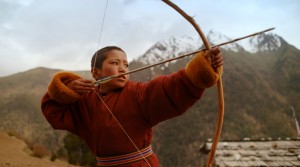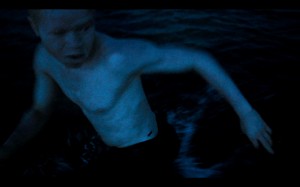

By Kim Voynar Voynar@moviecitynews.com
Sundance 2014 Last Call
I got caught up in a whirlwind of post-production meetings when I returned to Seattle, and didn’t get a chance to write up a few more notable films. Here’s a final roundup of a few more noteworthy films I saw at this year’s fest.
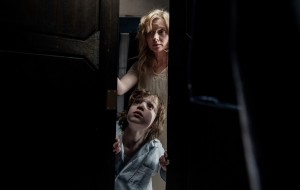 The Babadook
The Babadook
Taut, compelling Aussie horror-thriller about Amelia, a single mom struggling with the death of her husband, and her anxiety-ridden young son, who are stalked by a mysterious creature called The Babadook after a strange book shows up at their house. I know, it sounds kind of like an episode of Goosebumps, but up until the end it’s a pretty tight, engaging psychological thriller. Is the Babadook real, or is it a manifestation of maternal guilt and mourning? Femme writer-director Jennifer Kent explores these questions through the imagery of the story most effectively … until the last few minutes, when an ending that (to me) completely breaks from the theme of the rest of the film left me scratching my head, wondering if I’d projected that more was going on intellectually in the film than there actually is. It’s a strong enough film up until that point, an intriguing exploration of grief and survivors guilt, tied up neatly by some terrific performances, spot-on art direction, and spooky pacing — but man, I wish Kent would lose that ending.
The Case Against 8

An informative, compelling doc that tells the story behind the court battle over Proposition 8, which united a longtime conservative litigator with one of his biggest rivals in the battle to defend equality and the right of same-sex couples to marry. Pretty straightforward stylistically, but the filmmakers (and their editor) do a nice job of weaving together the story engagingly, shifting focus between the two couples named as plaintiffs in the lawsuit, and the legal battle that waged around them. Well worth the watch even if you think you know the whole story; you’ll be able to see it on HBO soon.
Zeresenay Berhane Mehari made a splash with his feature debut Difret (which, the fest programmer informed us before the screening, is the first Ethiopian feature to compete at Sundance). The film weaves a complex tale of social customs, patriarchy and women’s rights in this film based on a true story of a young girl abducted and raped for marriage, who shot her would-be husband while trying to escape. The storytelling is a bit clunky and literal, veering dangerously close to Hallmark Movie of the Week territory, which is unfortunate because the story itself is so compelling. It’s impactful nonetheless, and certainly a crowd pleaser; Difret took home the Sundance laurels for the audience award for World Cinema Dramatic.
Back in 2010 Thomas Balmès made the under-appreciated documentary Babies, which followed four babies in diverse parts of the world for a year. He was back at Sundance this year with another unconventional documentary, Happiness, in which he followed an eight-year-old monk in one of the most remote villages in Bhutan over the course of more than three years, as progress marches into the boy’s remote village in the form of electrical poles and televisions hauled up the mountain on horseback. At the Q&A following the screening of his film, Balmès noted that his team made the trip up to the village every few months, and that getting the crew and all their gear up there required about 50 donkeys; never let it be said that Balmès is not a patient and tenacious filmmaker.
As a documentarian, Balmès shows more than tells; his work tends to curate moments that strike him as meaningful into a largely abstract tapestry and let you make of them what you will. Consequently, Happiness is not a neatly delineated picture of narrative storytelling, nor is it quite traditionally structured documentary. True to form, the director’s work here tends toward the languid and fluid; we float gently along the placid life rhythm of this small village on a faraway mountaintop as the camera captures the subtle – and sometimes not so subtle – shifts in the cultural and social landscape wrought by the march of technological progress. Gorgeously shot, and very deserving of the World Cinema Cinematography award it received at the fest.
 Kumiko the Treasure Hunter
Kumiko the Treasure Hunter
Kumiko the Treasure Hunter was both the strangest and most affecting film I saw at Sundance this year. David and Nathan Zellner, the filmmakers behind Goliath and Kid-Thing, take us on an eerily dreamy journey with a delusional and obsessed young Japanese woman who’s convinced that the buried treasure in the movie Fargo is real, and that she alone is destined to find it. Anchored by a mesmerizing performance by Rinko Kikuchi and stunningly shot by rising DP star Sean Porter, Kumiko the Treasure Hunter was a surprise jewel of the fest for me. There’s nothing typically “Sundance” about it in story or form, yet it embodies the kind of film we come to this fest for year after year hoping to see: completely original, technically proficient, and simply mesmerizing.
Life Itself
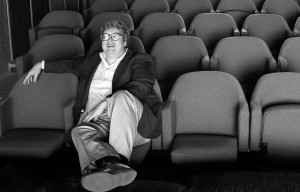
Deeply moving, well-constructed doc about film critic legend Roger Ebert, who died last April, directed by the ineffable Steve James (Hoop Dreams, The Interrupters). Packed with interviews and remembrances, this could have been a sappy sort of film. Instead — thanks in no small part to Roger demanding that the film be approached with honesty and integrity as he faced his final struggle in a long battle against cancer — the film shows us many faces of Roger Ebert: The driven, cocky young student editor who became a Pulitzer Prize winner; the journalist with a drinking problem; the ego battle with Gene Siskel that he came to regret as he grew older and wiser. And, perhaps what would have been most important to Roger himself, there’s a good deal of time spent on his relationship with his wife Chaz. James’ lens captures the full gamut of emotions underscoring Roger’s final months especially. The tender, ever-present love of Chaz for her ailing husband, and his for her; her fear of losing him when he the cancer came back; his wry resignation; her ultimate acceptance and willingness to let him go. Life Itself is beautiful tribute to a man who would have, perhaps more than anyone, appreciated the way in which his story is told.
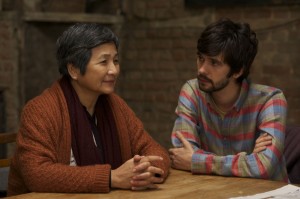 Lilting
Lilting
In Hong Khaou’s beautifully shot, meticulously paced character study, Lilting, Pei Pei Cheng plays a Cambodian-Chinese mother whose adult son has died in a tragic accident, opposite the always excellent Ben Whishaw as Richard, her dead son’s lover. Despite the communication barrier that separates them, Richard tries desperately to connect with the mother of the man he loved, hiring a pretty, young translator to assist. The film’s pacing does get draggy, particularly in the unnecessarily long opening sequence, and during many of the longer, clunkier translation bits that bog down the dialog flow. But it’s certainly very pretty to look at, and the story engages through earnest performances.
Intense tale of a hunter and prey, told from the perspective of Alias, an albino boy in Africa on the run from men who hack albinos to pieces with machetes so they can sell their body parts witch doctors. The film is a study in contrasts: hunter and prey, loyalty and betrayal, reason and riot. Even in its use of color palette – warm golds here, heavy use of contrast there, shadows disappearing into shadows, shapes only a vague memory — the film aims for art and largely achieves it. While the film overall could benefit from tightening up and trimming maybe 15-20 minutes of extraneous scenes that drag it down a bit, the bold artistic vision for this film, it’s stark juxtaposition of beauty and horror, marked it as worth watching in my book. White Shadow is the antithesis of all the serious-human-rights-issue narratives that forego style and lean solely on substance. This is how you make a cinematic, artistic film while still tackling very real human issues. Just stunning.










